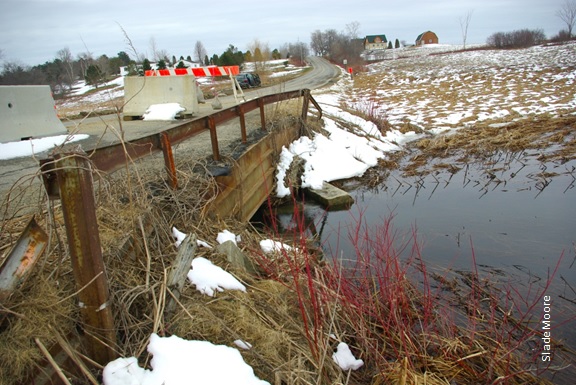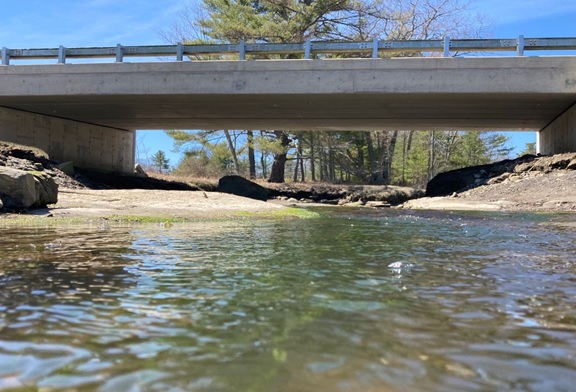
The Challenge
Safe, dependable roads are crucial for Maine's economy, access to critical services, and a way of life valued by citizens and visitors alike. Maintaining roads is a challenge for most communities in Maine, especially in coastal areas experiencing rapid change due to accelerated sea level rise. Where roads cross tidal wetlands at over 800 locations in Maine, the challenges are considerably magnified.
Tidal wetlands can provide coastal storm and flood damage protection, pollutant filtration and break-down, fish and wildlife habitat, commercial harvesting, and recreational opportunities. Some wetlands, like salt marshes, store atmospheric carbon that would otherwise contribute to sea level rise and other climate shifts. To deliver these benefits, tidal wetlands must remain healthy and resilient to sea level rise. That requires unimpaired tidal flow, but about 90% of Maine's tidal road crossings are tidal restrictions. These crossings put Maine's tidal wetlands at risk, but are also more apt to experience flooding, higher maintenance costs, and interrupted access to emergency services.

The CoastWise Approach
Traditional practices for designing tidal road crossings don't adequately address the unique complexities, uncertainties, risks, or benefits associated with tidal environments. In response, the Maine Coastal Program and the CoastWise Steering Committee convened experts in the field and marshaled the input of over 30 organizations to develop the Coastwise Approach for Tidal Crossing Design (pdf file, 7.3 MB). CoastWise provides a voluntary set of best practices, decision-making tools, and path for designing safe, cost-effective, ecologically supportive, and climate-resilient tidal crossings.
CoastWise Principles
Tidal wetlands are dynamic systems influenced by a wider range of interacting social and environmental factors than most non-tidal streams. Tidal road crossings require a design approach that adequately addresses complexity and risk, now and in the future. CoastWise Approach principals include:
- Know your tidal crossings: Learn which crossings are tidal now or likely to be in the coming decades; use the Maine Coastal Program's Tidal Restriction Atlas or other available tools.
- Start early: Tidal crossing design is complex and requires ample time to seek funding, collect and analyze diverse data types, establish clear objectives, and develop design alternatives.
- Ask for advice: Contact a CoastWise Technical Partner to help with project planning, connecting with the right resources, and providing other support.
- Engage qualified engineering: Expertise in data collection, analyses, sea level rise, tidal hydrodynamic modeling, and crossing design specific to tidal environments is the best fit.
- Encourage local participation: Crossing design requires value judgements having lasting impact. A transparent, participatory design process facilitates outcomes that serve communities best.
- Identify risk factors: Consider wetland condition, vulnerable species, and low-lying infrastructure and resource-uses within the crossing's influence, now and in the future.
- Plan for coastal change: Selecting an appropriate sea level rise scenario is essential to effectively plan for flooding, emergency access needs, and long-term cost effectiveness.
- Establish objectives: Clear, measurable objectives streamline the design process and save costs.
- Size crossings for resilience: To survive, marshes and other tidal wetlands upstream of crossings need unrestricted tidal exchange during the highest tides of the year for the life of the crossing.
Learn More
Downloads are PDF files less than 1 MB in size unless otherwise indicated, and may require free Adobe Reader software (download here) to view or print.
- CoastWise Approach Manual (PDF file, 7.3 MB)
- CoastWise Overview (A printable version of this page (PDF file, 2 pages, 1.9 MB)
- CoastWise Topic 1: Selecting a Sea Level Rise Scenario (PDF file, 5 pages)
- CoastWise Topic 2: Establishing Crossing Project Objectives (PDF file, 5 pages)
- CoastWise Topic 3: Modeling for Crossing Design Evaluation (PDF file, 3 pages)
Contacts
For information about the CoastWise Program, please contact Meredith Mendelson (below). For technical support on individual crossing projects, contact any of the providers listed below according to their service areas.
Statewide
Robert VanRiper
Coastal Habitat Restoration Specialist
robert.vanriper@maine.gov
207-592-5689
Bill Bennett
Fish and Wildlife Biologist
Gulf of Maine Coastal Program
U.S. Fish and Wildlife Service
william_bennett@fws.gov
207-781-8364 x15
Southern Maine
Jacob Aman
Project Manager
Wells National Estuarine Research Reserve
jaman@wellsnerr.org
207-646-1555 x112
Casco Bay
Matt Craig
Habitat Program Manager
Casco Bay Estuary Partnership
matthew.craig@maine.edu
207-228-8359
Downeast
Jeremy Gabrielson
Senior Conservation Planner
Maine Coast Heritage Trust
jgabrielson@mcht.org
207-607-4587
Participants from these Organizations Contributed to the Development of CoastWise

- Acadia Civil Works
- Bates College
- Bearcreek Wildlife Sanctuary
- Bowdoin College
- Casco Bay Estuary Partnership
- Columbia University
- Downeast Salmon Federation
- Goddard Space Flight Center
- Great Bay National Estuarine Research Reserve
- Inter-Fluve
- Kennebec Estuary Land Trust
- Maine Audubon
- Maine Coast Heritage Trust
- Maine Coastal Program, Maine Dept. of Marine Resources
- Maine Dept. of Inland Fisheries and Wildlife
- Maine Dept. of Transportation
- Maine Geological Survey, Maine Dept. of Agriculture, Conservation, and Forestry
- Massachusets Dept. of Fish and Game, Ecological Restoration Division
- Massachusetts Office of Coastal Zone Management
- Midcoast Conservancy
- Natural Areas Program, Maine Dept. of Agriculture, Conservation, and Forestry
- The Nature Conservancy
- New Hampshire Coastal Program
- New Hampshire Dept. of Enviromental Services
- New Hampshire Dept. of Fish and Game
- US Army Corps of Engineers
- US Federal Highway Administration
- US Fish and Wildlife Service
- US Geological Survey
- US National Aeronautics and Space Administration
- US National Oceanic and Atmospheric Administration
- University of Copenhagen
- University of Maine
- University of New Hampshire
- University of New Orleans
- University of Rhode Island
- VHB
- Wells National Estuarine Research Reserve
- Woods Hole Group
